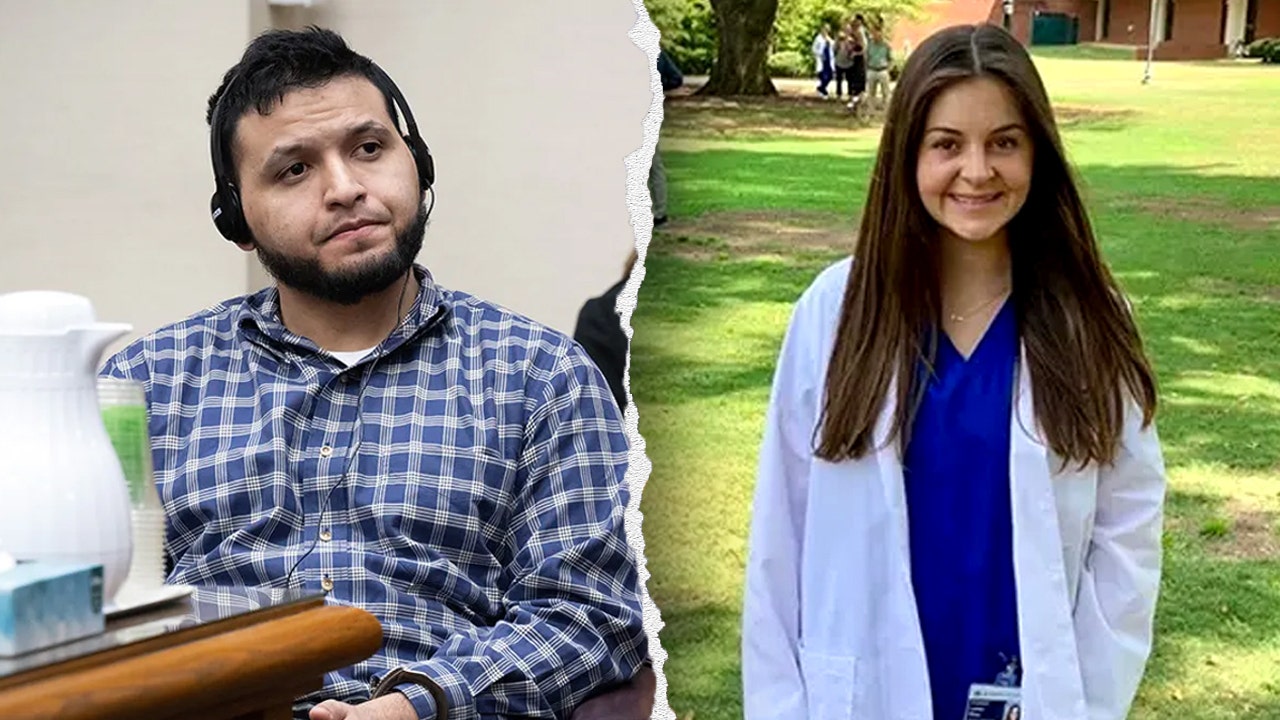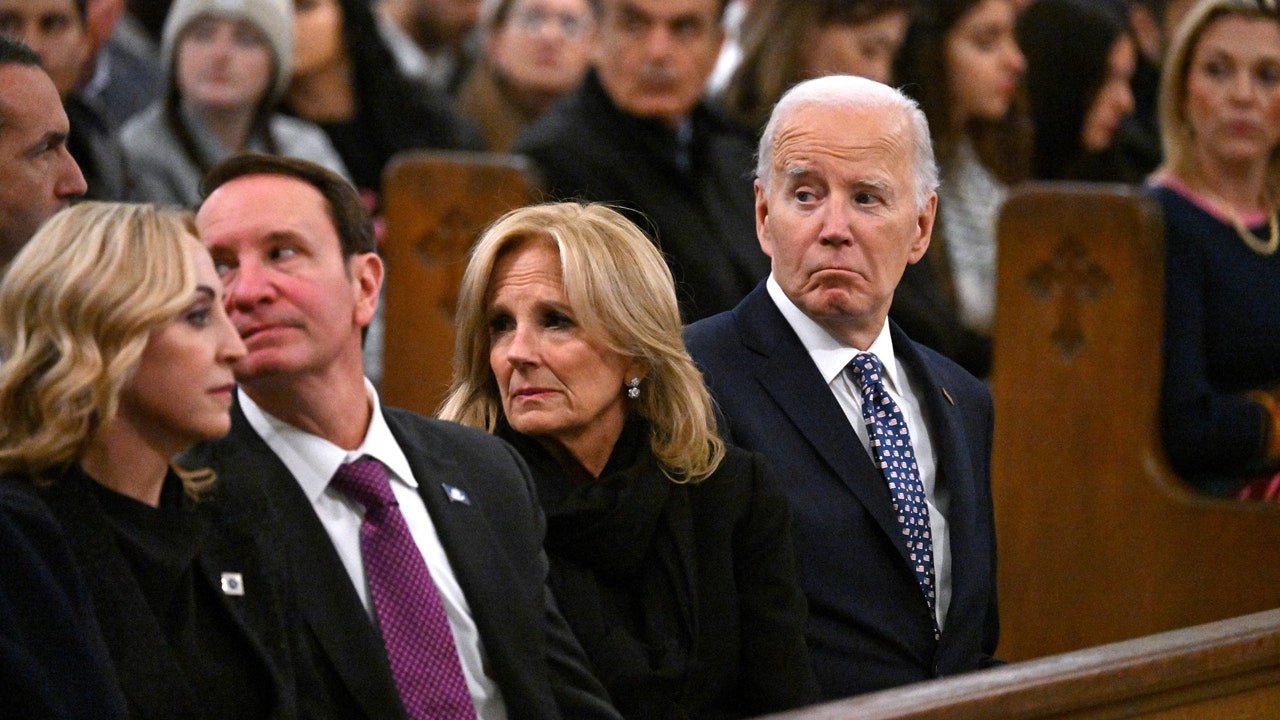World
Trump to be booked in Georgia election case: Here’s what to expect
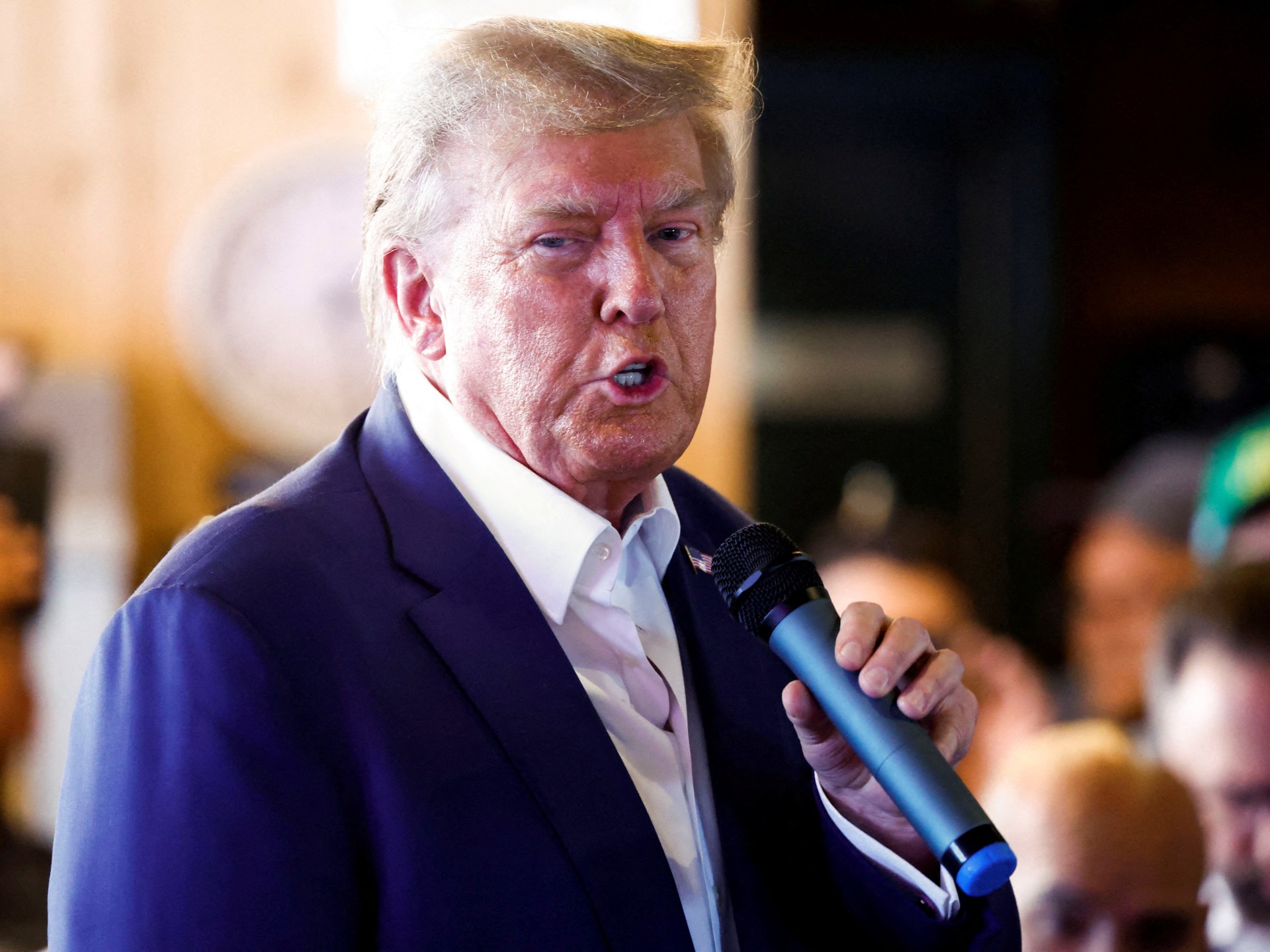
Donald Trump is set to turn himself in to authorities in the US state of Georgia, where the former United States president faces criminal charges over his efforts to overturn the result of the 2020 election.
Trump has said he will travel to the Fulton County jail in the state capital, Atlanta, on Thursday, but he has not given a specific time for his arrival.
It will be the fourth such surrender since April for Trump, who has been indicted in three other criminal cases this year but remains the frontrunner in the Republican Party’s 2024 presidential nomination race.
While some aspects of the legal proceedings in Georgia will be familiar, others are set to be new because this is the first criminal case Trump has faced under the state’s jurisdiction.
Here’s what to you need to know:
What will happen when Trump surrenders?
Fulton County Sheriff Pat Labat has stressed that he plans to treat Trump the same way he treats other suspects booked at the Fulton County jail.
That means Trump will likely be fingerprinted and have his mugshot taken after he turns himself in.
If that does happen, it will be the first time the former president has had his mugshot taken in any of the four criminal cases against him. His legal team had been able to evade the common procedure previously.
“Unless somebody tells me differently, we are following our normal practices, and so [it] doesn’t matter your status, we got mugshots ready for you,” Labat told local media after Trump’s indictment this month.
The jail is open 24 hours a day and Georgia authorities have given the ex-president and his 18 co-defendants until Friday at noon (16:00 GMT) to turn themselves in.
Will Trump stay in jail?
The Fulton County jail has become notorious for its unsanitary and unsafe conditions, and the US Department of Justice last month opened an investigation into the facility.
Fifteen incarcerated people died at the jail last year, according to the Atlanta Journal-Constitution, and there have been four deaths reported in the past five weeks.
However, Trump is not expected to spend long there. His legal team has already negotiated a $200,000 bond agreement, meaning he will be immediately released after being booked and paying at least 10 percent of the bond.
The Fulton County Sheriff’s Office has said there will be “a hard lockdown” of the area surrounding the jail with no one allowed in or out when Trump arrives.
Trump’s former lawyer John Eastman and Republican poll watcher Scott Hall, who were also charged in the case, surrendered on Tuesday.
When will Trump be arraigned?
In each of the other criminal cases against Trump this year, the former president was booked, and then shortly afterwards, he was taken before a judge for a brief arraignment hearing to formally hear the charges and enter his plea.
In Georgia, these processes will be done separately.
Fani Willis, the Fulton County district attorney, who brought the case against Trump and his co-defendants, has asked for the arraignments to take place the week of September 5 and for the trial to begin on March 4, 2024. No dates have currently been set.
The arraignment in Georgia could also be unique because television cameras are generally allowed in courtrooms in the state depending on the judge’s discretion.
That would stand apart from Trump’s arraignment in New York in April on charges linked to a hush-money payment made to a porn star, where only still cameras were allowed.
It would also differ from Trump’s two previous federal arraignments – on election interference charges and allegations he mishandled secret government documents – after which only courtroom sketches of Trump were released.
Judge Scott McAfee, who is presiding over the Georgia case, can decide whether Trump needs to appear in person for his arraignment or whether he can appear virtually.
What were Trump and his co-defendants charged with?
In the 98-page Georgia indictment released last week, prosecutors charged Trump and his 18 co-defendants – including Trump’s White House Chief of Staff Mark Meadows and his high-profile personal lawyer Rudy Giuliani – with a total of 41 criminal counts.
Trump faces 13 charges, including soliciting a public officer to violate his oath, conspiracy to commit forgery, and making false statements and filings.
All of the defendants, including Trump, also face a racketeering charge under the state’s Racketeer Influenced and Corrupt Organizations Act, known as RICO.
The charge, which is usually reserved for organised crime and corruption, allows prosecutors to target multiple people who commit separate crimes while working towards a common goal.
The Georgia case is also the first time Trump has faced charges that carry a minimum sentence. That would mean that if convicted on those charges, the ex-president would be required to serve prison time.
Will the Georgia case affect Trump’s re-election bid?
The Georgia case along with Trump’s three other criminal indictments have created a scheduling headache for the ex-president as he seeks the Republican presidential nomination.
The trials are likely to begin in the heat of the 2024 campaign season, and Trump’s legal team is expected to try to delay the start of the legal proceedings.
Under the US Constitution, there is no restriction on Trump running for or being elected president, even if he is convicted of the crimes. However, the current situation is unprecedented, and it is unclear how a possible prison sentence would be navigated.
Trump has denied the charges in all the cases, saying the indictments are part of a coordinated political attack that aims to derail his re-election bid.

World
Earthquake 50 miles from Mount Everest leaves at least 95 dead in Tibet
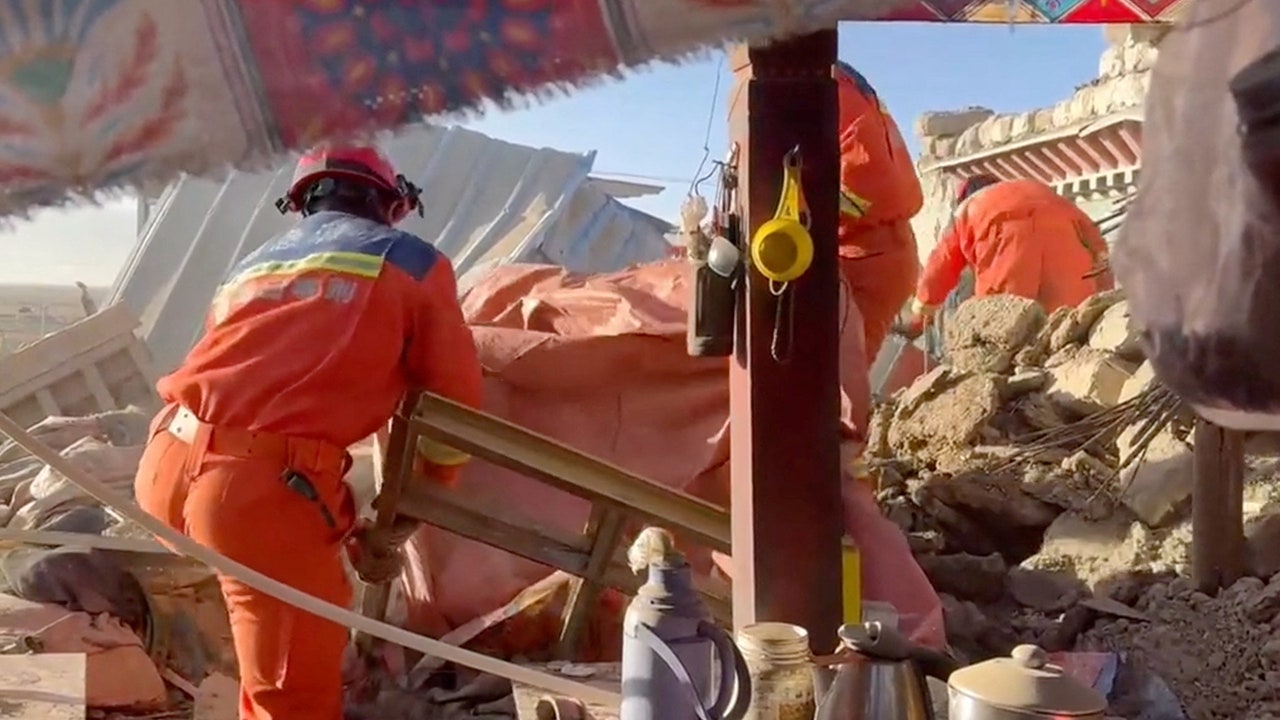
A powerful magnitude 7.1 earthquake centered about 50 miles from Mount Everest left at least 95 dead in Tibet on Tuesday, reports say.
Another 130 people have been injured on the Chinese side of the border, state broadcaster CCTV reported, citing the vice mayor of Shigatse.
Rescue workers climbed mounds of broken bricks, some using ladders in hard-hit villages, as a search is now ongoing for survivors. More than 1,000 homes are believed to have been damaged in the region.
Videos posted by China’s Ministry of Emergency Management showed two people being carried out on stretchers by workers treading over the uneven debris from collapsed homes.
CDC MONITORING POSSIBLE SPIKE OF HMPV CASES IN CHINA
People stand among damaged houses in the aftermath of an earthquake in southwestern China’s Tibet Autonomous Region on Tuesday, Jan. 7, 2025. (Xinhua/AP)
The morning quake also woke up residents in Nepal’s capital of Kathmandu – about 140 miles from the epicenter – and sent them running out of their homes into the streets.
The U.S. Geological Survey said the earthquake measured magnitude 7.1 and was relatively shallow at a depth of about six miles.
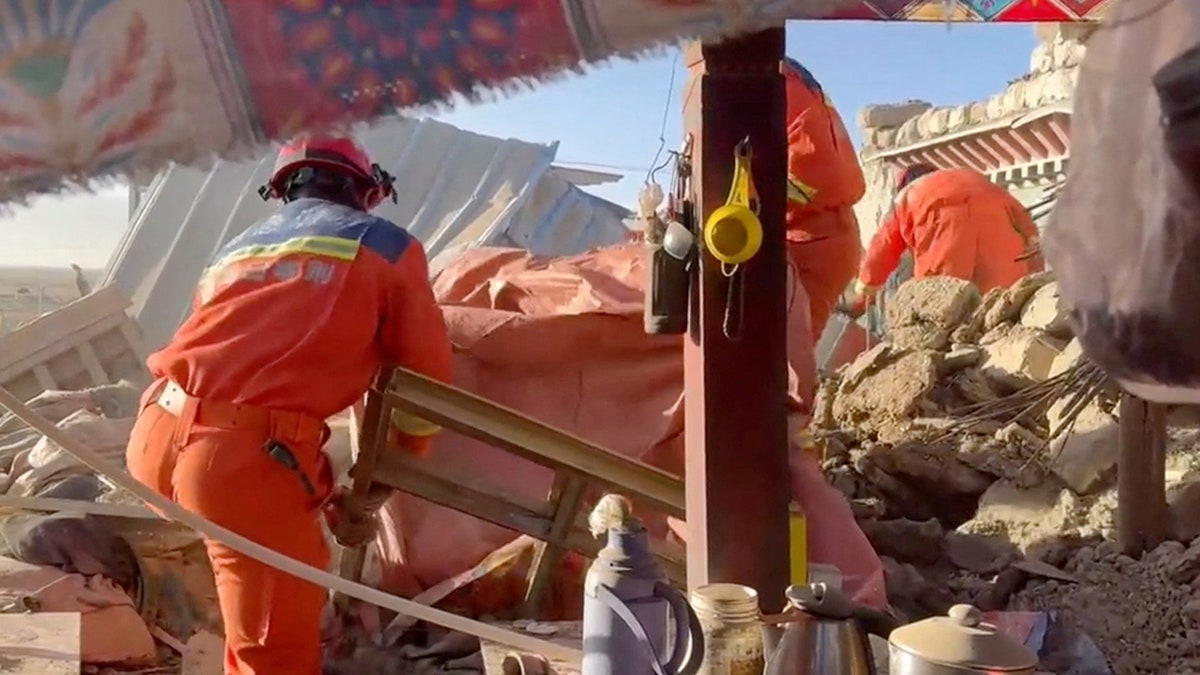
Rescue teams sift through rubble in the aftermath of an earthquake in Shigatse City in Tibet on Tuesday, Jan. 7, 2025. (Tibet Fire and Rescue/Reuters)
About 50 aftershocks were recorded in the three hours after the earthquake, and the Mount Everest scenic area on the Chinese side was closed, according to The Associated Press.
CHINA ROLLS OUT ITS CRIME-FIGHTING BALL TO CHASE DOWN CRIMINALS
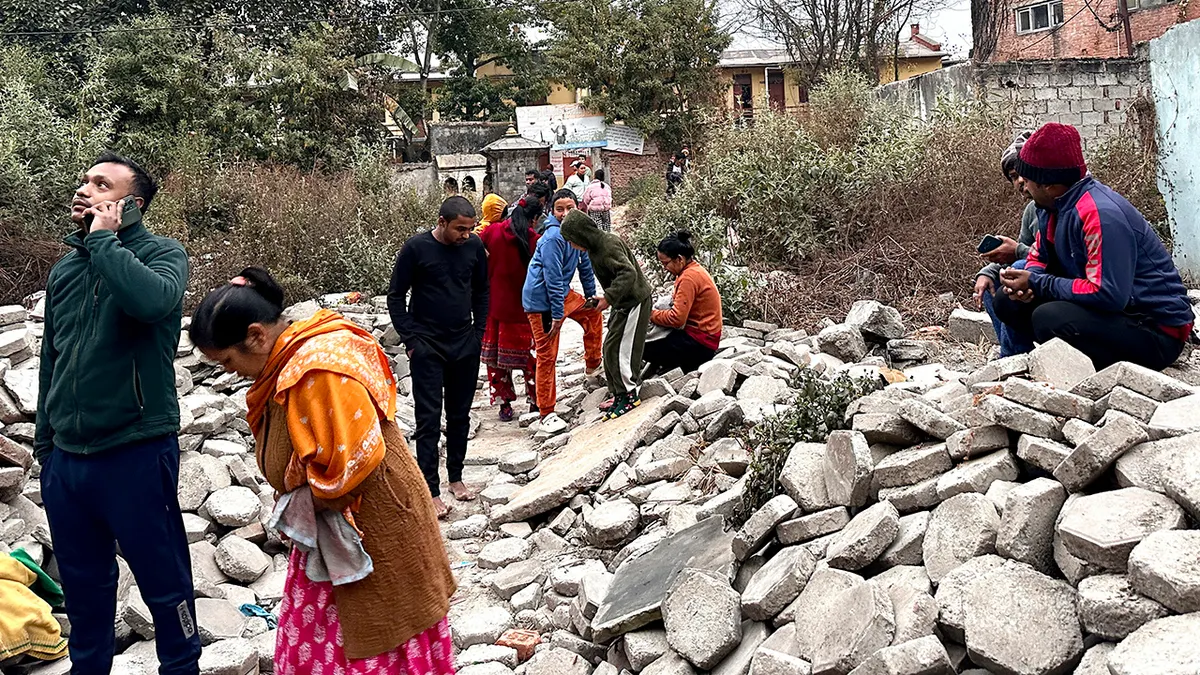
People in Kathmandu, Nepal, rushed out of their homes on Tuesday following the earthquake. (AP/Sunil Sharma)
The news agency cited CCTV as saying that more than 3,000 rescuers were deployed to the region to help with disaster relief.
About 7,000 people live in three townships and 27 villages within 12.5 miles of the epicenter on the Chinese side, state media added. The average altitude in the area is about 13,800 feet, the Chinese earthquake center said in a social media post.
On the southwest edge of Kathmandu, a video viewed by the AP showed water spilling out into the street from a pond in a courtyard with a small temple.
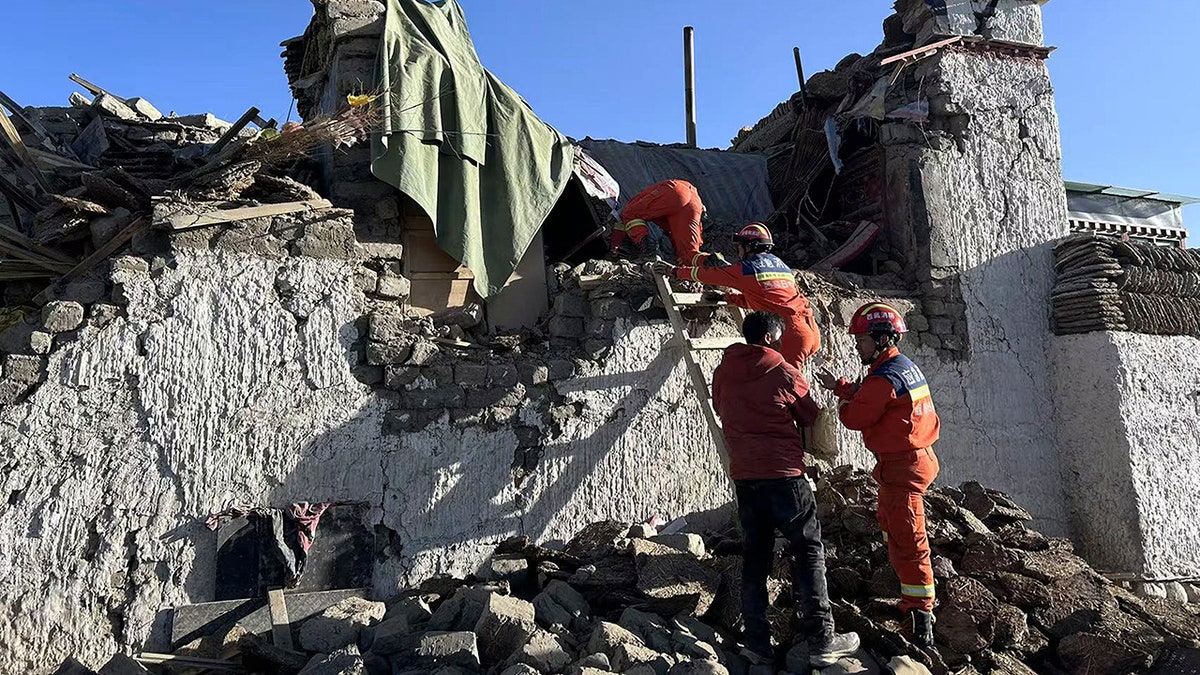
Rescue workers search for survivors in the aftermath of an earthquake in Changsuo Township in southwestern China on Tuesday, Jan. 7, 2025. (Xinhua/AP)
“It is a big earthquake,” a woman can be heard saying. “People are all shaking.”
The Associated Press contributed to this report.
World
‘We didn’t have anybody there’: Kyiv’s troops struggle as Russia advances

Kyiv, Ukraine – As Ukrainian forces fight in the western Russian region of Kursk, they are encountering a new enemy – elite North Korean servicemen.
On Sunday, Ukrainian infantry and armoured vehicles resumed an offensive in three directions in Kursk, trying to fence their toehold in the district centre of Sudzha that they had seized in August.
By Tuesday, they occupied at least three villages northeast of Sudzha – and inflicted losses on the North Koreans that fight in separate units under Russian command.
“We thinned their ranks – they have losses, although Kim didn’t just send ordinary servicemen,” a Ukrainian soldier told Al Jazeera, referring to North Korean leader Kim Jong Un.
He did not disclose his name, details and exact whereabouts of the battles in accordance with wartime regulations.
South Korean and US officials have said Kim deployed more than 10,000 elite soldiers to Kursk. Hundreds are understood to have been killed there already.
More than 450km (280 miles) south of Kursk, another Ukrainian serviceman keeps repelling waves of Russian infantrymen near the key southeastern city of Pokrovsk.
“Looks like they send a new brigade every day,” the serviceman told Al Jazeera.
Russians keep advancing despite a reported lack of tanks and armoured vehicles.
“They keep pushing. The only problem they have is their equipment, they can’t throw it around the way they did three or four months ago,” he said.
But the biggest problem his unit – as well as all of Ukraine’s armed forces – faces is a dire shortage of manpower.
Last week, Ukrainian troops retreated from the eastern town of Kurakhove, which Russian troops claimed control of on Monday.

Kyiv’s forces have also lost a key coal mine near Pokrovsk and could be about to lose Ukraine’s biggest lithium deposit in Shevchenkove.
“The Kurakhove defence installations have been taken over just because we didn’t have anybody there,” the serviceman said. “The most motivated soldiers have been killed, the new ones lack training and motivation.”
He also cited poor decisions made by commanding officers, alleging they want to appease their superiors and do not value the lives of servicemen.
“I’ve been wounded so many times because of the commanders’ stupidity,” he said.
Russians ‘looting’ in Donetsk town
The Russian forces that seized Kurakhove are looting abandoned apartments, a local woman alleged.
“They’re breaking into apartments that haven’t been damaged by shelling, they steal everything they can carry away,” Olena Basenko, a former sales clerk from Kurakhove who is looking for her elderly aunt who refused to leave the town, told Al Jazeera.
“Some ‘liberators’ they are,” she said sarcastically referring to Moscow’s pledge to “liberate” Ukraine from President Volodymyr Zelenskyy’s “neo-Nazi junta” – Russian claims that have been debunked throughout the war.
Ukraine’s shortage of manpower has led some analysts to doubt Kyiv’s push to resume the Kursk offensive.
“Zelenskyy’s strategy is to amass brigades with equipment in the rear only to solemnly lose them in the land of Kursk to gain 1.5km [1 mile] of farmland,” Nikolay Mitrokhin, a researcher with Germany’s Bremen University, told Al Jazeera.
The units that are advancing in Kursk could instead have been used to defend Kurakhove, he said.
However, others see the Kursk offensive as a chance to gain an important bargaining chip.

Ukraine may try to seize a Russian nuclear power plant in the town of Kurchatov that lies about 70km (45 miles) northeast of Sudzha and could attempt to seize Kursk’s regional capital 30km (20 miles) farther away.
If successful, the takeover of Kurchatov may become a significant strategic gain, according to the former deputy head of Ukraine’s general staff of armed forces.
“We didn’t want to make things worse, but we need to,” Lieutenant General Ihor Romanenko told Al Jazeera.
Kyiv may also invade the nearby Russian region of Bryansk, dealing a heavy blow to Russian President Vladimir Putin’s domestic reputation, he said.
“It will be painful to Putin, and if there is an offensive somewhere in Bryansk or some other regions, it will make him think,” Romanenko said.
Some Russians ridicule Putin’s policies that led to the first foreign invasion of western Russia since World War II.
“If the grandpa from the bunker is so wise, why do we have Ukrainians on Russian land? Something must be wrong,” Roman, a 48-year-old Muscovite who served in a tank unit in the 1990s, told Al Jazeera, deriding the Russian president.

Bryansk borders Ukraine and has been repeatedly attacked by two Ukrainian military units made up of pro-Ukrainian Russian fighters.
Romanenko said Putin’s decision to ramp up Russia’s offensive in southeastern Ukraine signifies a “fiasco” of Trump’s “peace plan”.
“This approach ended with a fiasco because Putin rejected the version proposed by Trump’s team,” he said.
Trump has offered few details of the plan, but, according to his team, it may include the establishment of a “demilitarised zone” along the current front line, Kyiv’s ceding of Russia-occupied areas and a delay of Ukraine’s NATO membership.
Ukraine’s sea drone weapons
At the end of last year, Ukraine scored a small victory that may herald huge losses in Russian navy bases and civilian seaports.
On December 31, Ukrainian sea drones, or un-piloted vessels armed with small missiles, attacked Russian helicopters in the bay of Sevastopol, the main naval base in annexed Crimea.
Ukraine claimed to have shot down two helicopters, killing all 16 crew members.
Moscow acknowledged no losses but said its forces destroyed four Ukrainian unmanned aircraft and two sea drones.
The attack showed that sea drones could wreak havoc on Russian port and naval infrastructure along the Black Sea, Bremen University’s Mitrokhin said.
Furthermore, Kyiv could use sea drones for attacks on the Russian navy in the Baltic, Barents and White Seas and in the Pacific.
“There is so much infrastructure there that it will be hard to cover it even with boom barriers, let alone protect them from all sides like in Sevastopol or [the Crimean port of] Feodosiya,” he said.

Meanwhile, the ongoing war of attrition tests Ukraine and Russia’s economies.
The Russian economy has “partially adapted to the pressure from [Western] sanctions, but it currently enters the inflation shock of overheating and slower growth” because of the Central Bank’s high percentage rates, Kyiv-based analyst Aleksey Kusch said.
The Ukrainian economy is “in shock” because of severely damaged energy infrastructure and a lack of labour force, he said.
But hydrocarbon exports help Russia’s economy recover from the shock, while Ukraine is kept afloat by Western financial aid.
“It creates a certain parity effect amid resistance to war,” Kushch told Al Jazeera.

World
The next round of bitter cold and snow will hit the southern US
ANNAPOLIS, Md. (AP) — The next round of bitter cold was set to envelop the southern U.S. on Tuesday, after the first significant winter storm of the year blasted a huge swath of the country with ice, snow and wind.
The immense storm system brought disruption even to areas of the country that usually escape winter’s wrath, downing trees in some Southern states, threatening a freeze in Florida and causing people in Dallas to dip deep into their wardrobes for hats and gloves.
By early Tuesday, wind chill temperatures could dip into the teens to low-20’s (as low as minus 10.5 C) from Texas across the Gulf Coast, according to the National Weather Service. A low-pressure system is then expected to form as soon as Wednesday near south Texas, bringing the potential of snow to parts of the state that include Dallas, as well as to Oklahoma, Arkansas and Louisiana.
The polar vortex that dipped south over the weekend kept much of the country east of the Rockies in its frigid grip Monday, making many roads treacherous, forcing school closures, and causing widespread power outages and flight cancellations.
Ice and snow blanketed major roads in Kansas, western Nebraska and parts of Indiana, where the National Guard was activated to help stranded motorists. The National Weather Service issued winter storm warnings for Kansas and Missouri, where blizzard conditions brought wind gusts of up to 45 mph (72 kph). The warnings extended to New Jersey into early Tuesday.
A Kentucky truck stop was jammed with big rigs forced off an icy and snow-covered Interstate 75 on Monday just outside Cincinnati. A long haul driver from Los Angeles carrying a load of rugs to Georgia, Michael Taylor said he saw numerous cars and trucks stuck in ditches and was dealing with icy windshield wipers before he pulled off the interstate.
“It was too dangerous. I didn’t want to kill myself or anyone else,” he said.
The polar vortex of ultra-cold air usually spins around the North Pole, but it sometimes plunges south into the U.S., Europe and Asia. Studies show that a fast-warming Arctic is partly to blame for the increasing frequency of the polar vortex extending its grip.
Temperatures plunge across the country
The eastern two-thirds of the U.S. dealt with bone-chilling cold and wind chills Monday, with temperatures in some areas far below normal.
A cold weather advisory will take effect early Tuesday across the Gulf Coast. In Texas’ capital of Austin and surrounding cities, wind chills could drop as low as 15 degrees (minus 9.4 C).
The Northeast was expected to get several cold days.
Transportation has been tricky
Hundreds of car accidents were reported in Virginia, Indiana, Kansas and Kentucky, where a state trooper was treated for non-life-threatening injuries after his patrol car was hit.
Virginia State Police responded to at least 430 crashes Sunday and Monday, including one that was fatal. Police said other weather-related fatal accidents occurred Sunday near Charleston, West Virginia, and Monday in Winston-Salem, North Carolina. Kansas saw two deadly crashes over the weekend.
More than 2,300 flights were canceled and at least 9,100 more were delayed nationwide as of Monday night, according to tracking platform FlightAware. Ronald Reagan Washington National Airport reported that about 58% of arrivals and 70% of departures had been canceled.
A record 8 inches (more than 20 centimeters) of snow fell Sunday at the Cincinnati/Northern Kentucky International Airport, leading to dozens of flight cancellations that lingered into Monday. About 4 inches (about 10 centimeters) fell Monday across the Cincinnati area, where car and truck crashes shut at least two major routes leading into downtown.
More snow and ice are expected
In Indiana, snow covered stretches of Interstate 64, Interstate 69 and U.S. Route 41, leading authorities to plead with people to stay home.
“It’s snowing so hard, the snow plows go through and then within a half hour the roadways are completely covered again,” State Police Sgt. Todd Ringle said.
The Mid-Atlantic region had been forecast to get another 6 to 12 inches (15 to 30 centimeters) of snow on Monday. Dangerously cold temperatures were expected to follow, with nighttime lows falling into the single digits (below minus 12.7 C) through the middle of the week across the Central Plains and into the Mississippi and Ohio valleys.
In North Texas, 2 to 5 inches (about 5 to 13 centimeters) of snow was expected beginning Thursday, according to the National Weather Service. Snow could also hit Oklahoma and Arkansas, with some parts potentially getting more than 4 inches (about 10 centimeters).
Classes canceled in several states
School closings were widespread, with districts in Indiana, Virginia, Kentucky, Missouri and Kansas canceling or delaying the start of classes Monday. Among them was Kentucky’s Jefferson County Public Schools, which canceled classes and other school activities for its nearly 100,000 students.
Classes were also canceled in Maryland, where Gov. Wes Moore declared a state of emergency Sunday and announced that state government offices would also be closed Monday. Government offices also were closed Monday in Kentucky, where Gov. Andy Beshear declared a state of emergency.
Tens of thousands are without power
Many were in the dark as temperatures plunged. More than 218,000 customers were without power Monday night across Kentucky, Indiana, Virginia, West Virginia, Illinois, Missouri and North Carolina, according to electric utility tracking website PowerOutage.us.
In Virginia’s capital city, a power outage caused a temporary malfunction in the water system, officials said Monday afternoon. Richmond officials asked those in the city of more than 200,000 people to refrain from drinking tap water or washing dishes without boiling the water first. The city also asked people to conserve their water, such as by taking shorter showers.
City officials said they were working nonstop to bring the system back online.
___
Whittle reported from Portland, Maine. Associated Press journalists Bruce Schreiner in Shelbyville, Kentucky; Dylan Lovan in Louisville, Kentucky; Ben Finley in Norfolk, Virginia; Lea Skene in Baltimore; Kathy McCormack in Concord, New Hampshire; Julie Walker in New York; Sophia Tareen in Chicago; Kimberly Chandler in Montgomery, Alabama; Zeke Miller in Washington, D.C.; John Raby in Charleston, West Virginia; Summer Ballentine in Columbia, Missouri; and Hallie Golden in Seattle contributed.
___
Read more of the AP’s climate coverage at http://www.apnews.com/climate-and-environment
-

 Health1 week ago
Health1 week agoNew Year life lessons from country star: 'Never forget where you came from'
-
/cdn.vox-cdn.com/uploads/chorus_asset/file/24982514/Quest_3_dock.jpg)
/cdn.vox-cdn.com/uploads/chorus_asset/file/24982514/Quest_3_dock.jpg) Technology1 week ago
Technology1 week agoMeta’s ‘software update issue’ has been breaking Quest headsets for weeks
-

 Business6 days ago
Business6 days agoThese are the top 7 issues facing the struggling restaurant industry in 2025
-

 Culture6 days ago
Culture6 days agoThe 25 worst losses in college football history, including Baylor’s 2024 entry at Colorado
-

 Sports6 days ago
Sports6 days agoThe top out-of-contract players available as free transfers: Kimmich, De Bruyne, Van Dijk…
-

 Politics5 days ago
Politics5 days agoNew Orleans attacker had 'remote detonator' for explosives in French Quarter, Biden says
-

 Politics4 days ago
Politics4 days agoCarter's judicial picks reshaped the federal bench across the country
-

 Politics3 days ago
Politics3 days agoWho Are the Recipients of the Presidential Medal of Freedom?





/cdn.vox-cdn.com/uploads/chorus_asset/file/25820943/66c5ad743940374440b92fc089aa0d7638074917.png)
